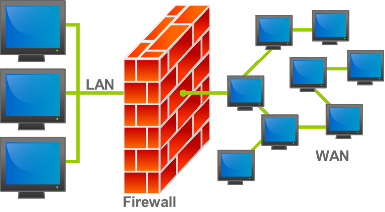What Does a Firewall Do?
A firewall is simply a program or hardware device that filters the information coming through the Internet connection into your private network or computer system. A firewall trusts nobody unless it is told otherwise. It secures your computer from the outside world. It helps protect computers inside a large company.
A company can set up rules like this for FTP servers, Web servers, Telnet servers, and so on. In addition, the company can control how employees connect to Web sites, whether files are allowed to leave the company over the network, and so on. A firewall gives a company tremendous control over how people use the network.

A firewall examines all traffic routed between the two networks to see if it meets certain criteria. If it does, it is routed between the networks, otherwise, it is stopped.
A firewall filters both inbound and outbound traffic. It can also manage public access to private networked resources such as host applications. It can be used to log all attempts to enter the private network and trigger alarms when hostile or unauthorized entry is attempted. Firewalls can filter packets based on their source and destination addresses and port numbers. This is known as address filtering.
Firewalls can filter specific types of network traffic. This is also known as protocol filtering because the decision to forward or reject traffic is dependent upon the protocol used, for example, HTTP, FTP, or telnet.
Firewalls can also filter traffic by packet attribute or state.
